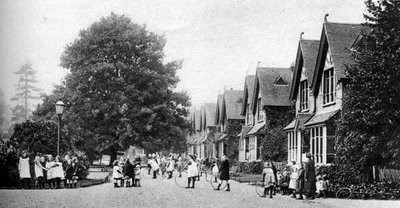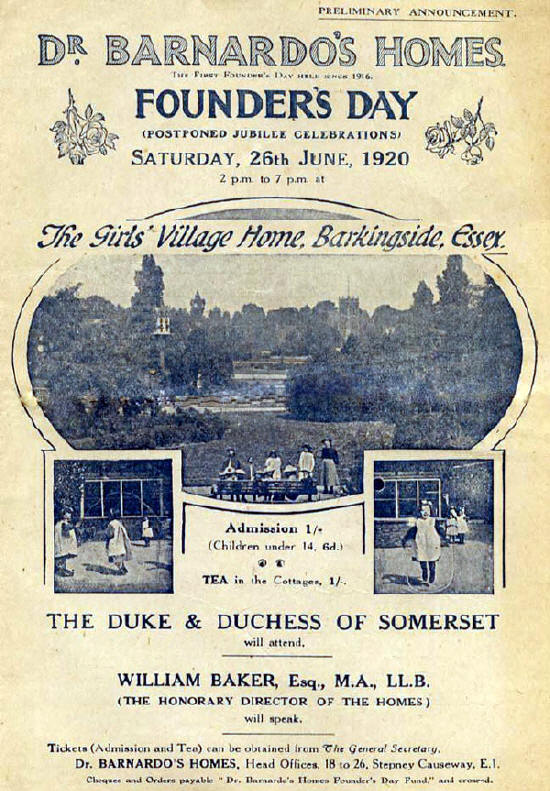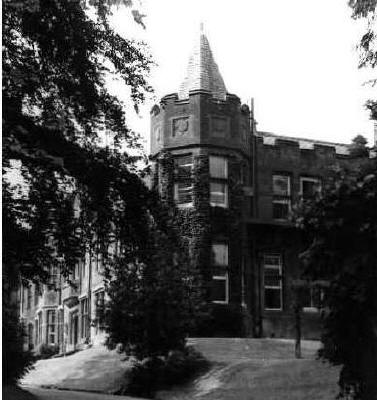Nora Isabel Adnams: Habits, Culture and Beliefs
‘Never spend every penny you earn, money commands respect, more so now than ever … but at the same time, be generous to the less fortunate, but please don’t be patronising.’ (17)

Nora Isabel Adnams’ autobiography centres almost entirely around her childhood memories, providing interesting insight into the habits and culture of the Barnardo’s children’s home in which she grew up. Nora grew up in Daisy Cottage at Barkingside Village for girls, and she has vivid memories of the treatment, activities and traditions she was surrounded by. Nora also includes information that allows us to speculate about her beliefs later in life, as she speaks directly to the reader in present day on several occasions, revealing the strong morals living in Barnardo’s taught her.
Firstly, Nora’s memoir places great emphasis on the activities and traditions of the Barnardo’s children’s home in which she grew up. Most of Nora’s happy memories involve playing with the other girls in the home, and she recalls many mischievous moments with apparent fondness, commenting on how ‘easily pleased’ (19) they were with the games they concocted. It is interesting to note the girls’ interest in the game ‘”Mothers and Fathers”’ (19), as whilst this is very common among children, there is something almost heart-breaking about the Barnardo’s girls recreating family life when they have been separated from their parents.
Nora also comments on how she loved to spend time outdoors, and her writing emphasises the sense of escapism that spending time away from the children’s home allowed. Nora describes ‘happy times’ (13) on trips to Epping Forest, and how ‘all the summers seemed fine and hot’ (13) and the girls would arrive home ‘tired and happy, after such freedom for a day’ (14). These memories are powerful ones for Nora; her highlights of leaving the home really emphasise the unhappiness she must have felt when indoors at Daisy Cottage.

The Barkingside home placed emphasise on religion, and had a church on the grounds that the children attended on a Sunday. This did not, however, appear to affect Nora’s beliefs, as she seems more inclined to discuss the ‘high jinx’ (19) she got up to when the older girls attended ‘Christian Endeavour’ (19) meetings. She also notes how on rainy Sundays, the girls were made to memorise Psalms, but seems to relate this more to the consequences of not learning them – ‘Heaven help the child that had not learnt what she was given!’ (19) – rather than gaining any kind of spiritual enlightenment.
Cultural experiences of the outside world are particularly limited in Nora’s childhood, and this is shown throughout the piece in several ways. Nora discusses how ‘I had never been in a shop, or spent money, had tea with anyone, been in another house, spoken to a boy or a man‘ (10), and this understandably goes on to affect Nora when she eventually leaves Barkingside. Nora also finds the strict rules she encountered at Barnardo’s difficult to shake off, and comments how she often embarrassed her mother by asking permission when it wasn’t necessary. These ordeals emphasise how Nora missed out on a traditional family upbringing, and how this went on to affect her habits and behaviours even after she had left Daisy Cottage.

Although Nora does not have a traditional childhood, we get an insight into some very interesting traditions within the children’s home itself. An example of this can be seen in ‘Founder’s day’ (18), in which members of the public paid to look around the Barkingside grounds, and ate their dinner in the cottages, forcing the girls to go without supper. This episode gives us our first glimpse on how Nora’s upbringing has affected her in adult life, as whilst the visitors are allowed to use fancy crockery, the children were only allowed basic plates and mugs. Nora comments ‘How I hate the sight of enamel cups, plates etc., absolutely nauseating, that is why I do like a dainty cup and saucer now’ (18). Though this may seem trivial to some, it is clear that Nora sees this as a division between adult and child, and more dramatically between the upper classes who visited, and the children who were in poverty. In this instance, Nora’s dainty cup and saucer not only represents her growth since her time at Barnardos, but could also be a sign that as an adult she has moved up the class system and away from poverty.
Nora briefly discusses her views in the present day, and it is fascinating to see how her childhood has affected her as an adult. For example, ‘Never spend every penny you earn, money commands respect … but at the same time be generous to the less fortunate, but please don’t be patronising’ (17). This statement shows Nora to have strong beliefs in helping those in need, and it is clear that she wants to lead by example. This further suggests that Nora has escaped from poverty by this stage in her life, and wishes to help others with her experience. It is clear that Nora is passionate about the subject, as she comments ‘Well I did not mean to preach, but I feel very strongly, as you know’ (17). This shows Nora to be a wilful and motivated woman, and the reader feels proud that she appears to have developed strong morals out of such a trying time in her life.

Finally, we see that Nora has recently visited Babies Castle (another Barnardo’s children’s home), and comments on the great improvements that have been made over time. She suggests it to be a much better environment than Daisy Cottage, stating how ‘thrilled, pleased and delighted’ (26) she was to visit, and feeling she was ‘born fifty years too soon’ (26). It is important to note, however, that Nora does not appear bitter, and seems genuinely pleased that others could and have benefitted from her experiences and the development of Dr Barnardo’s homes. This shows a great deal about her beliefs, as she seems to have a positive outlook and appears genuinely touched that these children have benefitted from a place that caused her distress.
‘Nora Isabel Adnams’, ‘MY MEMOIRS OF DR. BARNARDO’S HOME, BARKINGSIDE, ESSEX’, , University of Brunel Library, Special Collection: 2:859
All images – www.goldonian.org – Web Accessed 20th December 2014

Leave a Reply